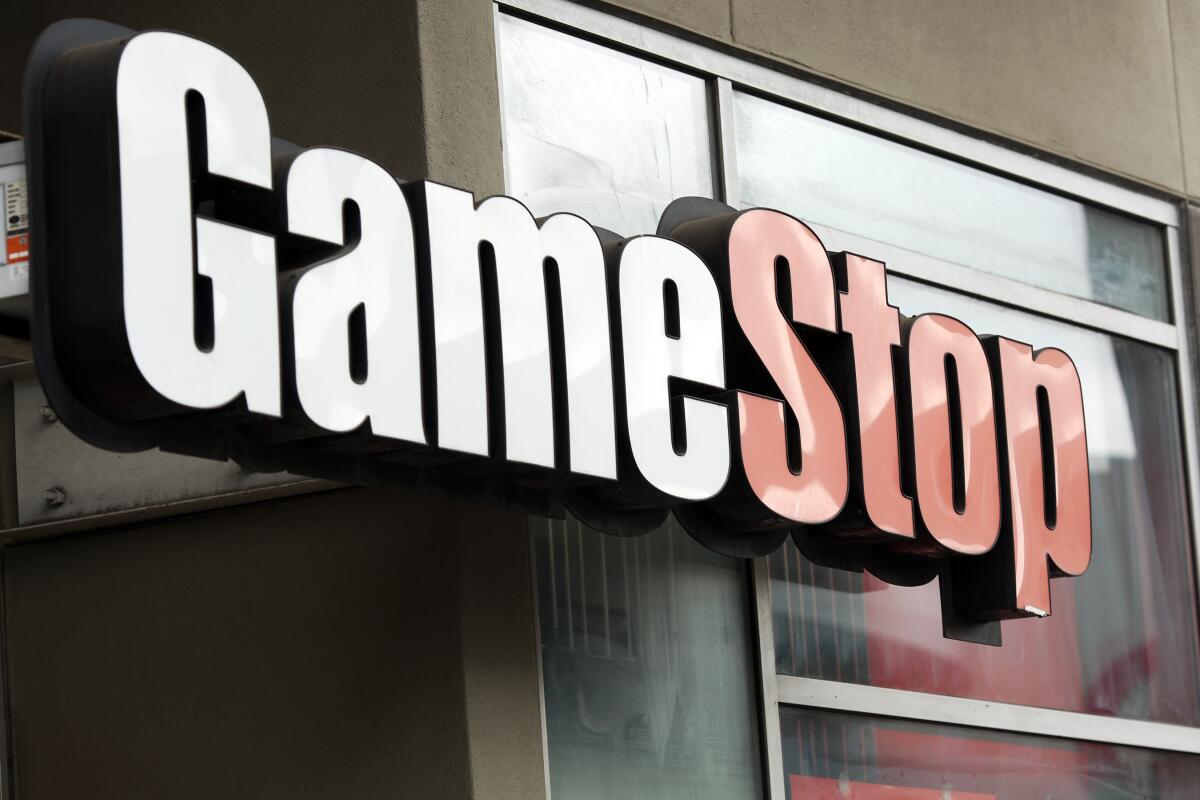The SEC needs to take a hard look at the GameStop mania

- Share via
Unleashed by online services such as Robinhood and Webull that make it cheap and easy to buy and sell stock, small investors went into open revolt this week against the Wall Street establishment — in particular, the hedge funds that place big bets against publicly traded companies. And for a few days, it looked like the little people were winning.
And then the trading services slammed on the brakes, cutting the hedge funds’ losses at the expense of the individual traders who’d driven up the share prices of GameStop, AMC Entertainment and a handful of other companies. The high-fliers all plummeted — GameStop had dropped 44% by the market’s closing bell Thursday, AMC 56%. Some of the services eased their restrictions later in the day, and prices started to rise again in after-hours trading.
The episode cries out for an investigation into the creation and handling of these stock bubbles, and at least one will be forthcoming from Sen. Sherrod Brown (D-Ohio), who is set to become chairman of the Senate Banking Committee. The trading cutoff in particular drew outrage from conservative Republicans and progressive Democrats alike.
The question is, who’s the bad guy in this story? Some hedge fund managers complained that investors who gathered in online communities like Reddit’s WallStreetBets forum manipulated the market by coordinating the buying spree. But grass-roots investors accused the low-cost trading services of intervening to rescue the big funds, which were able to keep trading in GameStop and other stocks while individual investors were sidelined.
We’re having trouble ginning up a detectable amount of sympathy for the Wall Street mavens on this one, even if the price surges bear a passing resemblance to the kind of “pump and dump” scheme in which swindlers con people into inflating the price of cheap shares in a troubled company.
It’s true that the companies whose prices skyrocketed this week are facing serious challenges. That’s why the hedge funds were betting against them, engaging in a version of “short selling” — the practice of borrowing shares, selling them and then counting on the price to go down sharply so the shares can be bought on the cheap and then returned.
But there appears to have been a different game afoot here. The grass-roots investors bought shares in these companies for the express purpose of making the short sellers lose money. That’s an extremely risky play, given that a well-capitalized short seller with the right type of contracts can simply wait until the stock falls back to its true value. But if a short seller faces a deadline, as apparently was the case here, the seller can’t wait out the surge — it has to join in the buying spree, pushing the price even higher.
The timeout called by Robinhood and other budget broker-dealers eased the trading fever and let the hedge funds and other major investors squeeze out of the cycle, albeit with enormous losses. Unless the stocks regain their mojo, though, the many investors who bought these companies near the peak are looking at big losses of their own.
The Securities and Exchange Commission needs to take a hard look at what happened here. But one thing should be clear: It’s not the SEC’s job to prevent investors from taking risks, even stupid ones, on Wall Street. It’s to prevent investors from being taken by Wall Street.
One key question to be answered is whether anyone sought to manipulate grass-roots investors in order to make a quick profit off low-priced stocks. But messages encouraging people to join a crusade to hammer hedge funds aren’t in and of themselves proof of an intent to manipulate. They may just be evidence that hedge funds are wildly unpopular. Short sellers can perform a valuable service by identifying companies whose stocks are overvalued, but they’re more of a necessary evil than an upgrade.
More important, regulators and Congress need to find out why, exactly, the trading platforms intervened when they did. Robinhood tweeted that it was responding to market “volatility.” Three other services blamed the restrictions on costs imposed by the company they rely on to clear trades. A rapid rise in share prices poses big risks for companies that do not charge fees. Still, they need to honor the terms they offered to investors, and they need to be both transparent and predictable in how they conduct business.
The run-up in these stocks demonstrated the power wielded by individual investors liberated by low-cost trading platforms and informed by online communities. It may not have been used wisely in the case of these particular companies. But investors’ risks must not be amplified by a financial industry determined to protect its own.
More to Read
A cure for the common opinion
Get thought-provoking perspectives with our weekly newsletter.
You may occasionally receive promotional content from the Los Angeles Times.






